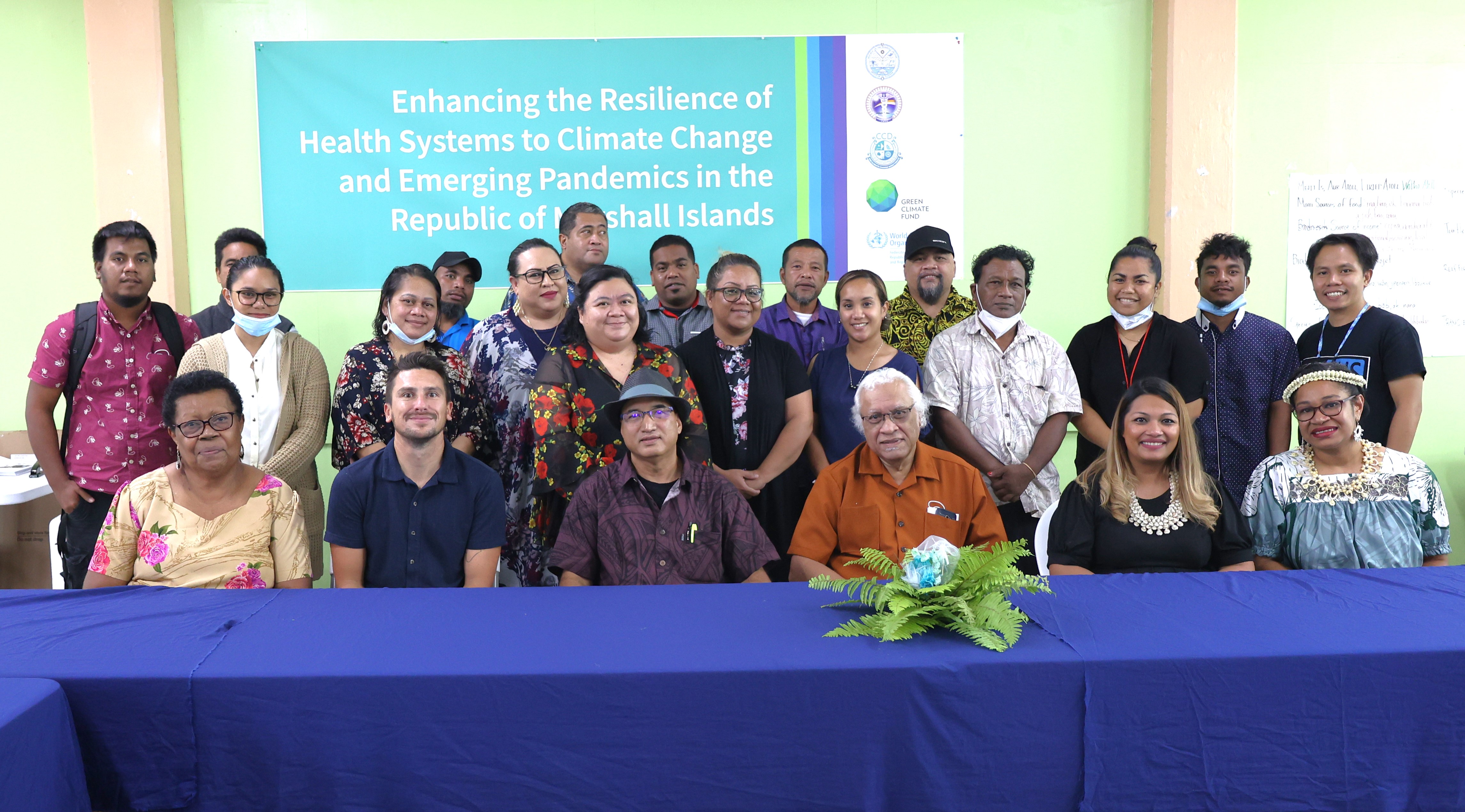The Ministry of Health and Human Services (MOHHS) and Ministry of Environment Climate Change Directorate (CCD) of the Republic of Marshall Islands (RMI) are partnering with the World Health Organization (WHO) to tackle the health impacts of climate change and enhance preparedness for future health emergencies, including the next pandemic.
The 18-month project, Enhancing the Resilience of Health Systems to Climate Change and Emerging Pandemics in the Republic of Marshall Islands, aims to ensure that the health system can continue serving patients in the face of a changing climate. With US$ 399,802 in funding support from the Green Climate Fund (GCF), the RMI Government and WHO will also focus on boosting the readiness of remote and outer islands of the RMI to protect health and save lives during future crises. This is the first GCF funded readiness project led by the health sector in a Pacific island country.
“We are excited to work with WHO and the Green Climate Fund on this new venture which will protect people across the Marshall Islands, particularly in outer islands, from the health impacts of climate change and other emergencies,” said Honourable Joe Bejang, Minister of Health and Human Services. “Around 640 health professionals will benefit from the support offered as part of this project, including training, guidance and communication tools. Furthermore, because the project focuses on enhanced health system resilience, as well as reduction of climate-related health risks, the project will indirectly benefit the whole population.”
As WHO’s report to COP26 stated, climate change is the number one health threat facing humanity. Climate change has the potential to cause a range of significant health impacts, including increased risk of water-borne diseases (e.g., diarrheal diseases) and vector-borne diseases (e.g., dengue), increased food and water insecurity leading to nutritional issues, and disruption of health systems due to climate-induced extreme weather events and sea-level rise.
“Like the rest of the Pacific, the Marshall Islands is on the frontlines of the climate crisis,” said Dr Mark Jacobs, WHO’s Director of Pacific Technical Support. “The evidence shows that the country is already facing increasing drought, sea level rise and inundation – all of which have impacts on health. But the country is also at the vanguard of adapting and responding to this crisis. Which is why we are proud to be working with the Marshallese government on this project, with support from the Green Climate Fund. Together, we can increase the resilience of the health system and save lives.”
Established by the United Nations Framework Convention on Climate Change (UNFCCC) in 2010, GCF is the world’s largest dedicated climate fund and is mandated to support developing countries achieve low-emissions, climate-resilient pathways.
“We are grateful for this opportunity to be able to access the GCF readiness support programme to help the Marshall Islands in partnership with WHO, build capacity and develop its long-term plans to combat climate change. Despite all the challenges we faced during the Pandemic, it was through cooperation and partnership that we were able to get this far. We look forward to seeing where this project takes the Marshall Islands and the lessons learned from enhancing the resilience of the health system in the country to climate variability and change,” said Mr Clarence Samuel, Director Climate Change Directorate and Green Climate Fund National Designated Authority.
“Readiness initiatives are so important to the countries GCF serves and are boosting the capacity of some of the world’s most vulnerable states to respond to climate change effectively. In that regard, we are pleased to partner with WHO and the Marshall Islands on this project to ensure climate resilient health systems. By funding readiness activities today, we are helping the Marshall Islands to better secure tomorrow,” said Ms Samantha Rabine, Regional Officer for Asia and the Pacific on behalf of Ms. Carolina Fuentes, Director of the Division of Country Programming at the Green Climate Fund.

Group photo of the participants during the project launch held in Majuro, Republic of Marshall Islands on 7 October 2022. In the photo are: Bottom seated (L-R): Asena Tinairania Kuricivi (Secondary Curriculum Director), Christopher Boyer (WHO), Clarence Samuel (Climate Change Directorate), Pastor Russell Edwards, Acting Secretary Francyne Wase-Jacklick (MOHHS Deputy Secretary) and event MC Jane Matanaicake-Lum On (MOHHS Epidemiologist); Top front row (L-R): Bruce Borran (MOHHS Surveillance), Loredel Areieta (JO-Jikum), Theresa Kedi (MOHHS Admin Assistant), Lani Milne, Edlen Anzures (MOHHS ELC Director), Romalynn Maddison Heine (MOHHS ESAR-VHP Coordinator), Kathleen Candle-Jikit (MOHHS Health Preparedness Director), Jackson Jacklick (MOHHS Ventor Control), Ann M. Chong Gum (MOHHS Public Information Officer), McGyver Takia (MOHHS Surveillance) and Nowel Delis (MOHHS IT); Top back row (L-R): Jason Lalimo (MOHHS Surveillance), Maika Bajo (MOHHS Health Promotion), Etika Temo (MOHHS IT), Aiti Kaious (MOHHS Admin Assistant) Bobson Solomon (MOHHS Vector Control), and Balton Nathan, (Ministry of Foreign Affairs).
About Green Climate Fund:
The Green Climate Fund (GCF) is the world’s largest dedicated climate fund. GCF’s mandate is to foster a paradigm shift towards low emission, climate resilient development pathways in developing countries. GCF has a portfolio of projects and programmes across more than 100 countries. It also has a readiness support programme to build capacity and help countries develop long-term plans to fight climate change. GCF is an operating entity of the financial mechanism of the United Nations Framework Convention on Climate Change (UNFCCC) and serves the 2015 Paris Agreement, supporting the goal of keeping average global temperature rise well below 2 degrees Celsius.
About WHO:
The World Health Organization (WHO) is the United Nation’s specialized agency for international public health. In the Pacific, WHO’s Division of Pacific Technical Support provides tailored, timely support to 21 Pacific Island countries and areas. Our main office is in Suva, Fiji, and the Division has six other offices across the region: The Federated States of Micronesia, Kiribati, Samoa, Solomon Islands, Tonga and Vanuatu.
